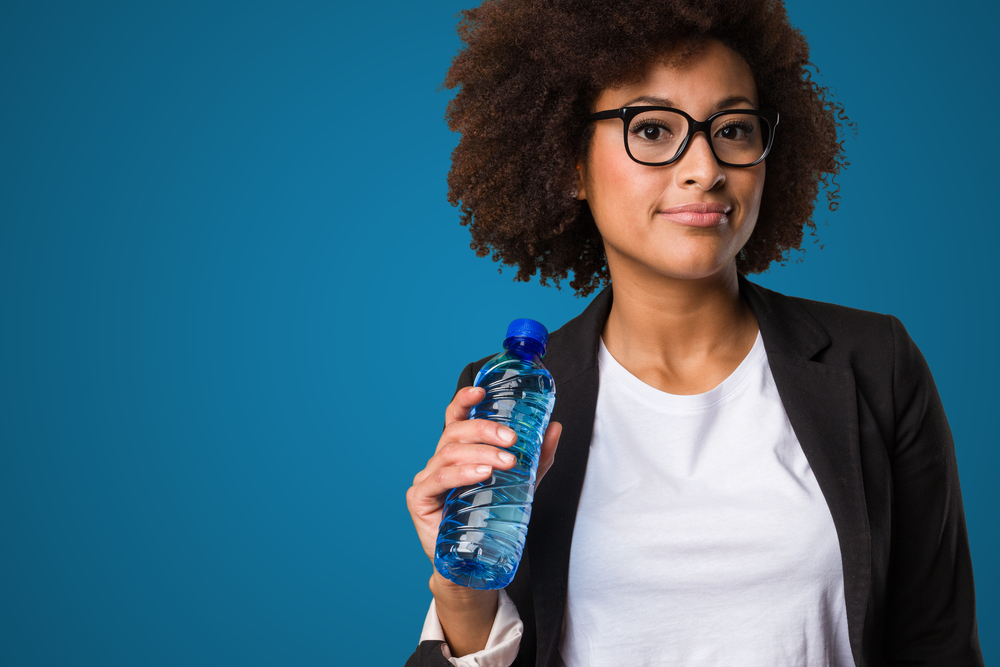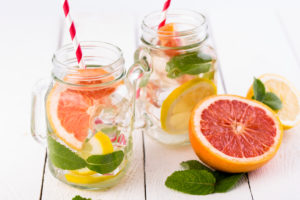
Asier Romero / Shutterstock.com
It’s not uncommon to see students carrying Nalgene bottles or Starbucks sippy cups full of water around campus, but it’s probably more common to see students carrying steaming to-go mugs and insulated travel mugs full of coffee, lattes, and espresso. With busy schedules that leave little time for students to stop back into their dorm rooms or apartments, there’s a rushed, on-the-go mentality that can take over on college campuses. Around finals, students may forget to eat meals or start eating meals with limited nutritional value. (In college, I was known to order pizza to the geosciences building so that I could work and eat at the same time.) Coffee can easily take over as the drink of choice. Sleep may become nonexistent. Water intake plummets.
The average adult human body is composed of 55–60% water. Every day, the human body uses and expels fluids primarily through urination, perspiration, and respiration. If you lose more water through the aforementioned processes than you take in, you will become dehydrated. While it’s often easy to tell if you’re suffering from dehydration (you feel thirsty, tired, dizzy, or have a headache), it is also reflected in the color of your urine. If it is clear or pale yellow, you’re taking in enough liquids; if it’s dark yellow or brown, you need to drink more water, fast.
- Individuals who are chronically dehydrated may have an increased risk of developing kidney stones. Kidney stones are exactly what they sound like: hard deposits that form in your kidneys and must be expelled in the same manner as urine; generally they are incredibly painful to pass. Since urine is filtered through your kidneys and toxins are expelled each time you use the bathroom, it makes sense that the chronically dehydrated would be at an increased risk for kidney stones. If you are not taking in enough liquids to force the toxins out of your system with regular urination, a buildup of toxins will occur in your kidneys.
If avoiding kidney stones isn’t enough of a reason for you to drink more water (though it should be, ouch!), there are a few others:
- Drinking water prevents constipation. I doubt I need to give you details about why it may be in your best interest to avoid that particular problem.
- Drinking water regulates your core temperature. If you are hot, your body will sweat out extra water to cool you down. If you’re cold, your body will refrain from sweating to keep as much heat in your system as possible.
- If you have a fever, your body’s core temperature is already elevated. Drinking water or broth, even if you feel terrible while doing it, will help cool you down and ensure that you have enough liquid in your system to sweat the fever out.
- Drinking water regulates your circulatory system. If you are dehydrated, your blood volume is decreased and your blood is thickened. Your heart rate will increase as a result because your heart is having to work harder to pump blood throughout your system; this is bad for your heart and can also cause headaches (your blood vessels constrict when you’re dehydrated to maintain a safe blood pressure).
- Drinking water maintains normal levels of saliva production. Having a dry mouth is generally an unpleasant feeling, but it can point to a deeper problem: dehydration.
- Drinking water keeps your skin looking young and fresh. When you’re dehydrated your skin will show wrinkles and feel dry to the touch. If you want to avoid having to buy an expensive moisturizer, stay hydrated. Your skin will naturally thank you.
- Drinking water lubricates your joints. If you’re a big fan of exercise, or even just walking around normally without feeling any pain, water is going to make sure your joints and muscles act efficiently. Dehydration can also cause cramping when you exercise.
- Drinking water can help with weight management. Thirst can disguise itself as hunger, so when you’re on the prowl for a mid-afternoon snack, try a glass of water or a cup of tea instead. If you’re still hungry after a few minutes, you’re probably actually hungry, but being more hydrated isn’t likely to hurt you.
The amount of water you need to drink each day depends on your age, overall health, level of activity, and location. (If you live in a hot or humid climate or at a high altitude, you need more water than your fair weather friends who live on the coast.) Generally, though, the average adult needs to take in between two and three liters of fluid every day. While the old rule of thumb states that you need to drink eight eight-ounce glasses (1.9 liters) of water each day, you really need to be drinking non-dehydrating liquids. If you’re not a huge fan of water, drinking juice, milk, coffee, and tea are also options. Technically, soda and sports drinks like Gatorade are options too, but drinking 64 ounces of Coke or Gatorade each day could do some pretty terrible things to your overall health (that much sugar isn’t good for anyone). The only substances, though, that truly will not hydrate you, are those that are alcoholic. While a beer or wine cooler may seem refreshing to the 21+ crowd, it doesn’t count toward your daily liquid intake.
Liquid can also come from food. Fruits, vegetables, and soup are all high in hydrating liquids, which is why many people crave fruit in the summer (they’re thirsty!). Water-rich foods may also keep you fuller for longer, since they’re bigger and take longer to digest. Eating a couple of slices of watermelon is going to do more for you than eating a couple of slices of kiwifruit. If you’re worried about your weight and your liquid intake, switch to liquid-rich snacks instead of crackers or chips and drink a glass of water at the beginning of each meal so you’re not starting with your stomach fully empty.
Arguably the most important time for an individual to stay hydrated is when exercising. Drinking water before (not excessively or immediately before starting; you don’t want to throw up), during, and after exercise will ensure that your muscles are top performers and that you have plenty of liquids to replenish those you lose as you sweat. If you do truly hardcore workouts, pure water isn’t going to be enough to rehydrate you. When you sweat, you lose electrolytes, like sodium and potassium. Drinking a sports drink or coconut water (or a glass of tap water with a pinch of salt and some lemon juice if you’re in a bind) will ensure that you replenish your electrolytes as well as the water you’ve lost.
- There is a slight risk to drinking too much liquid at one time. If you aren’t drinking something with electrolytes, an excessive amount of water will dilute the electrolytes that are currently in your body. When you’re incredibly hydrated but low on electrolytes, you could develop hyponatremia (low sodium levels in the bloodstream). While treatable, it can be dangerous. This illness can also develop if you are sick and experiencing a loss of fluids through vomiting or bowel movements. It’s important to replenish your lost fluids, but do so with a liquid containing electrolytes.

Igors Rusakovs / Shutterstock.com
Water isn’t a cure-all, but it’s certainly important for your body for proper functioning. Some people, though, just don’t like water or struggle to drink enough. These ways to drink more water may help you:
- Carry a water bottle with you at all times. Just having water on hand can be enough to make you drink it.
- Drink through a straw. When you drink through a straw, you don’t take in any air with each sip, unlike drinking sips from a rimmed cup or water bottle. Each sip through a straw, then, will be more efficient.
- Add flavorings. A slice of lemon, lime, or cucumber or a few mint or basil leaves can make a huge difference in making your water more tasty.
- Track your drinking habits with an app. You can do this on apps associated with fitness trackers (like FitBit) or through any number of free apps available for download, including Waterlogged, Water Drink Reminder, and Aqualert.
- Make your own “smart” water bottle. Get a clear water bottle and draw lines on it so you know what level you should be at each hour. If you fill a one-liter bottle at each meal, for example, you have until the next meal to finish it.
-
Preparing to Leave for College with a Chronic Illness
-
Surviving Homesickness as a Freshman in College
-
Seasonal Affective Disorder in College: Coping with Winter Depression
-
How to Respond to Cyberbullying
-
Why Everyone Should Get Counseling at Least Once in Their Life
-
Six Yoga Poses to Help with Anxiety and Panic Attacks
-
Everything You Need to Know about Mono
-
Why You Should Get a Flu Shot Now
-
Yoga for Detoxing from the Weekend
-
Finding Help for Alcohol and Drug Addiction: Where to Start and When to Reach Out

